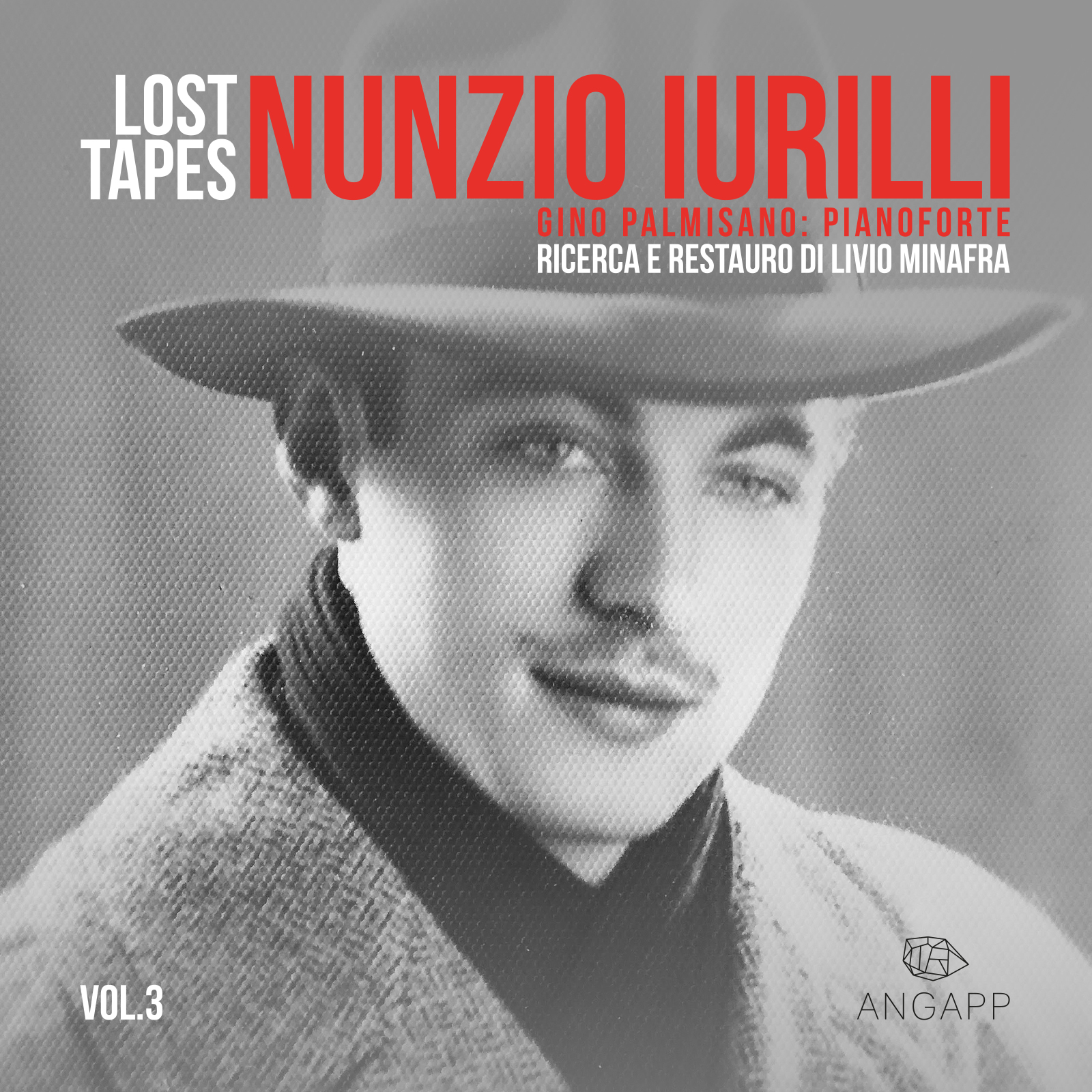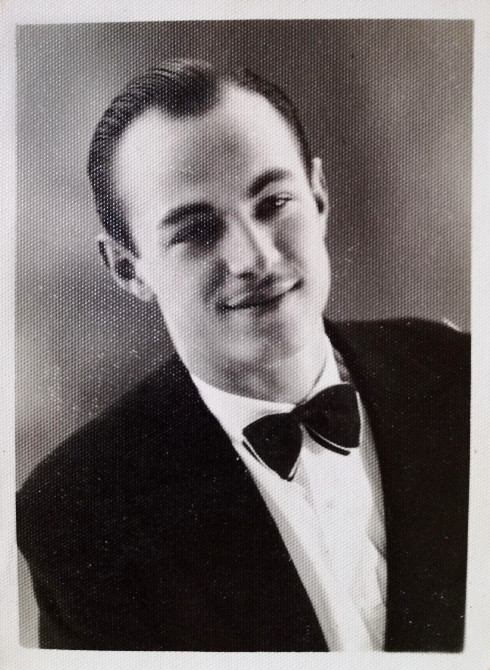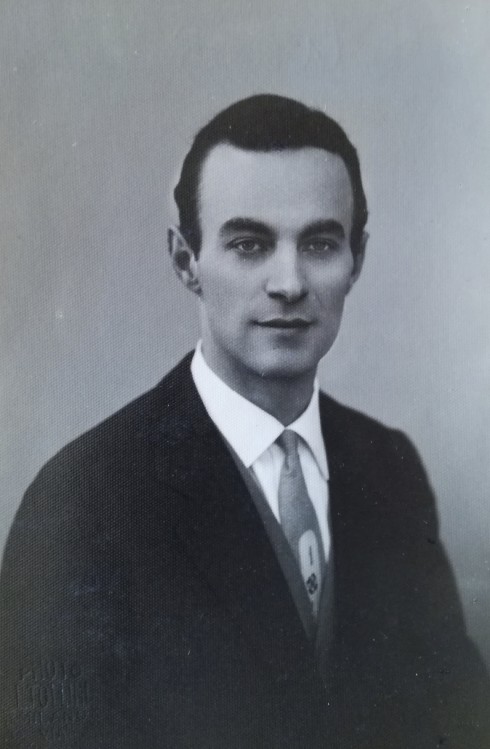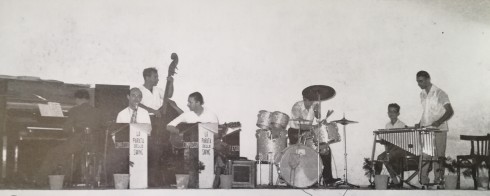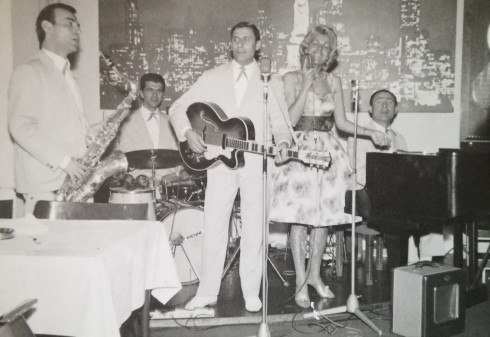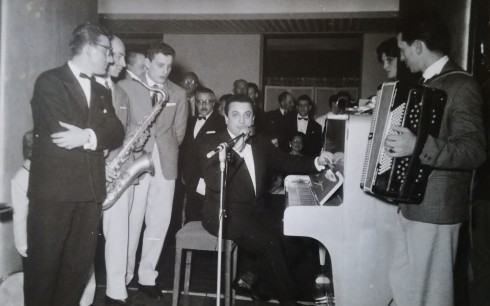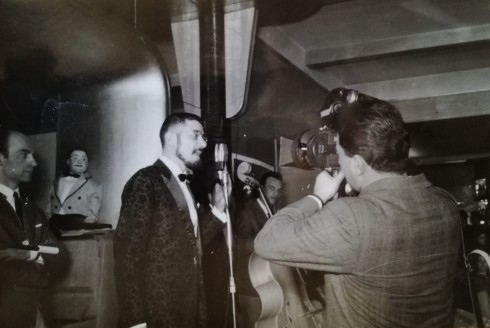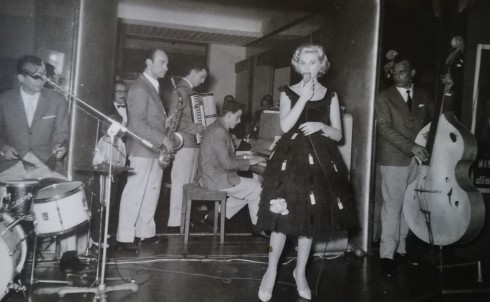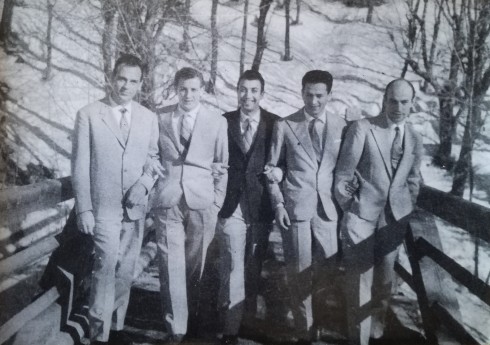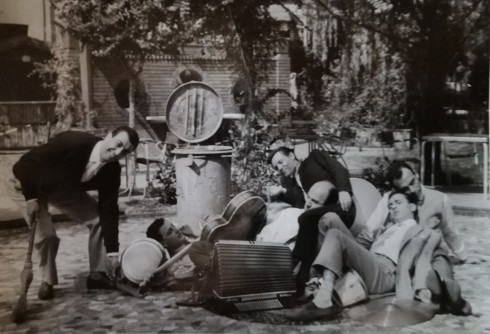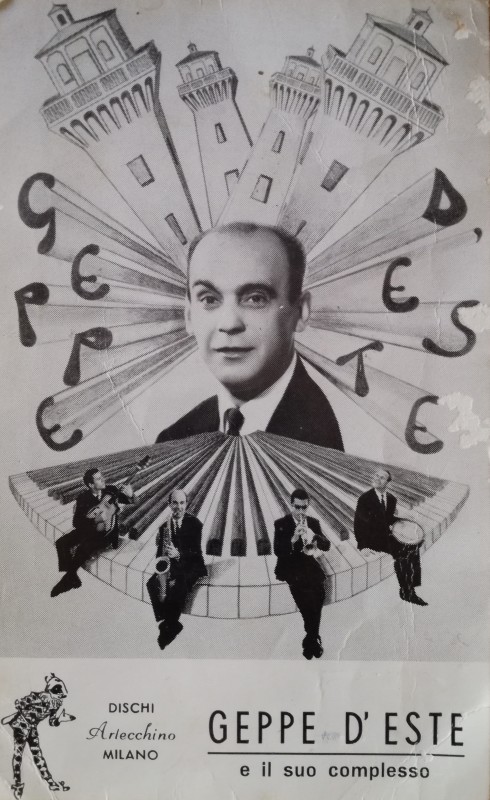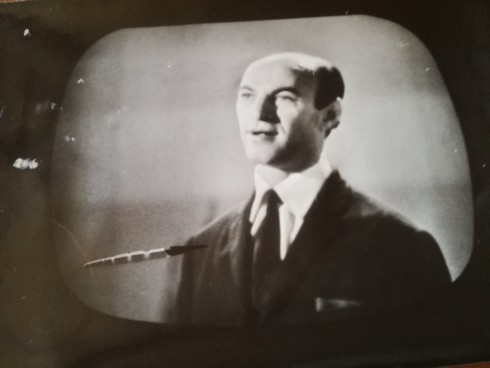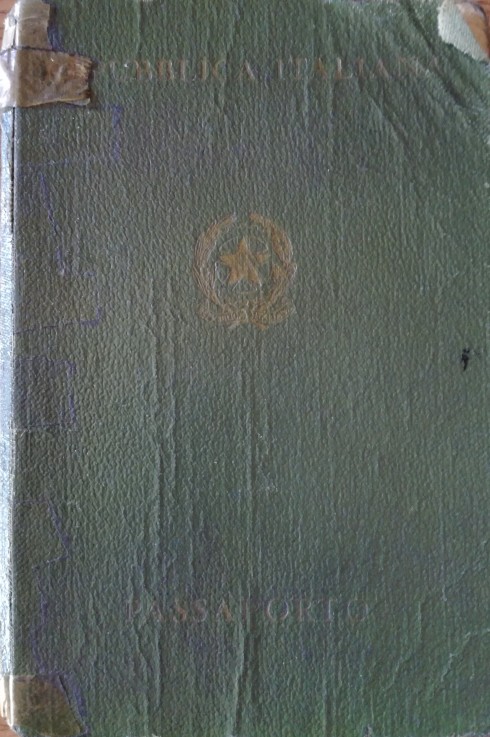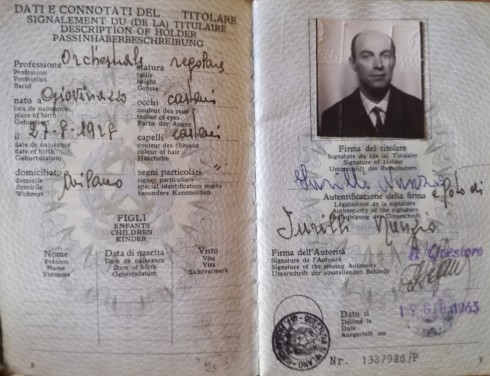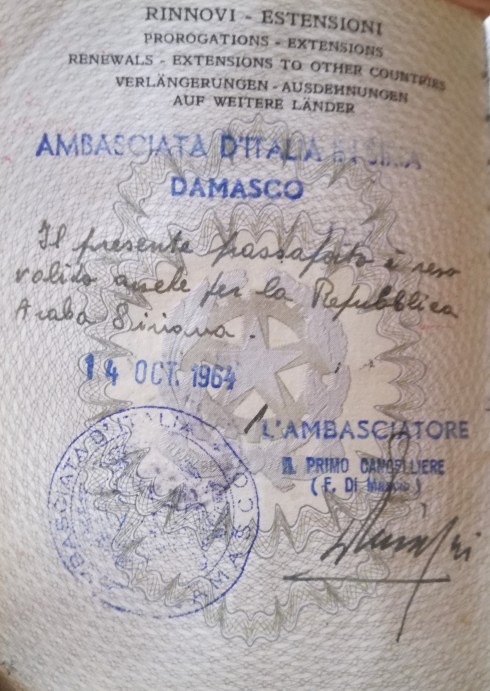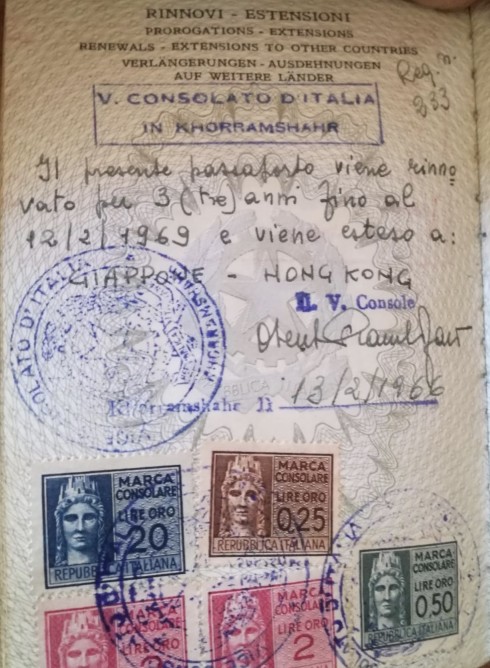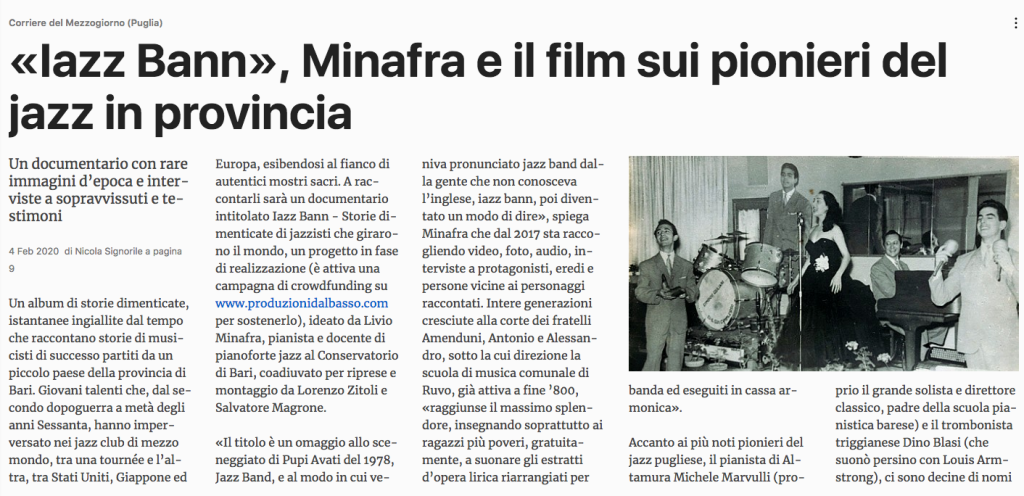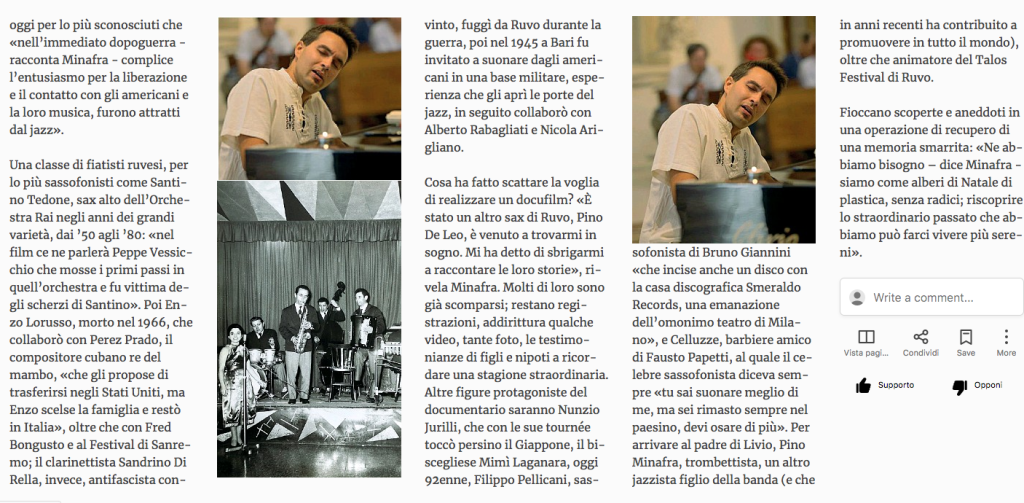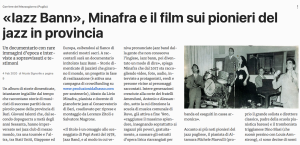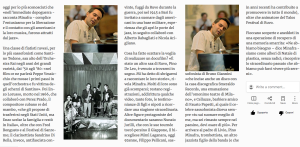Title: Lost Tapes Vol. 3 Nunzio Iurilli & Gino Palmisano
Group: Nunzio Iurilli voice and tenor sax, Gino Palmisano piano
Guests: Antonio Molinini soprano flugelhorn, Livio Minafra Hohner melodica
Years: 1980/2020 © 2020
Graphic: Giulio Lekklub
Translator: Rita Valentini
Discover, digitalization, sound track selection, editing: Livio Minafra
Mastering and restoration sound engineer: Gianluca Caterina, Dino Mignogna/Puffer Studio
Label: Angapp Music – It
Produced by: Livio Minafra
Nunzio Iurilli… and his solitude
Enzo Iurilli was born on 27th August 1928 in Giovinazzo, where he began studying the clarinet in the School of Music set in Ruvo di Puglia. He studied first with Antonio Amenduni and then with his brother Alessandro.
The first stories of Raffaele Magrone, musician and grandson of Mr Iurilli, identify Santino Tedone as a partner from the very first debut, one next to the other, in the marching band in Ruvo, with anecdotes such as the kicks that the veterans of the L gloriòs Band reserved for the youngest members or the excitement of the meat bought with the money of the first gig with the Band during the Holy Week in the late 1930s …
Maybe in his imagination the tales of the concerts of Tedone himself, then fifteen, with Bruno Giannini in 1943 among the American allied fields, as well as the first jazz plays on the radio which, although censored and “italicized” by the fascist regime (Louis Armstrong was Luigi Braccioforte), they were present with the definition of “music with a syncopated rhythm”.
We hear from Iurilli in local orchestras, among dancing teas, weddings and Carnival concerts. Still, always as a side job, his parents were against the fact that Iurilli conceived music as a real job. In other words, they wanted him to be a tailor.
The turning point came in 1956, due to the heavy snowfall that began in mid-February. Many people were stuck at home for months, so Nunzio started the type of saxophone study that Leopardi would have called “mad and desperate”, transcribing entirely themes and above all solo parts from some jazz records that he had procured from friends of Molfetta. In particular, he focused on the sound and phrasing of the Californian tenorist Stan Getz. And that’s how in the summer of 1956, at the age of 28, it can be said that the artist Iurilli was really born, given that – again from the stories of his nephew – it seems that from that moment on to those who listened to him “he did not seem even more than to hear an Italian saxophonist “.
He left Ruvo di Puglia and went in search of fortune. He stayed out almost continuously for about ten years, until 1967.
Starting from Milan (in historical places such as the Biffi and Le Tre Gazzelle bars, etc.) and Cortina d’Ampezzo in winter and the warmer months in the most famous holiday resorts such as Alassio and Gardone Riviera, he later turned for a long time and wide between northern Europe (Munich, Copenhagen, Helsinki and Stockholm), the Middle and The Far East, with surprising results to say the least. His passport records stamps from Syria, Lebanon, Iraq, Iran, Israel, Taiwan, Honk Hong and Japan …
Japan is told of the compliments received by Duke Ellington’s orchestral players in the Copacabana club in Tokyo where Iurilli played, while the American orchestra was passing through for a day off. Still in the same prestigious venue, while Nunzio sang and played with the orchestra, Sean Connery used to entertain himself at the time of filming “Agent 007, you only live twice”.
We have a photograph of Syria that portrays him while singing on national TV. And in fact, Iurilli started with the clarinet but then he concentrated on tenor sax and the voice. We know of recordings as a sideman in Persia (Iran), of tours on cruise ships in Scandinavia and of his recording shifts in Italy between the late 1950s and early 1960s with the Arlecchino Dischi of Milan (it is mentioned among the other Geppe D’Este), as well as with Smeraldo Records and Pippo Maugeri (famous in those years in Italy and Eritrea for the song “Asmarina”). Iurilli collaborated in Liguria also with Bruno Aragozzini in whose orchestra took part a very young Pino Presti, Giuseppe Prestipino, who would later become one of the significant arrangers of Mina and bassist of Astor Piazzolla in his concerts in Italy. With these words, he remembers Presti: “I met Nunzio Iurilli in the summer 1960, and now I have a clear memory of him also because it was my first professional contract in a complex. The venue was “Le Palme”, in Laigueglia (SV) and training it was made up of Bruno Aragosti, leader and pianist, Tano Gusmani on electric guitar, Nunzio Iurilli on tenor saxophone, Renzo Bergonzi on drums and me, seventeen, singer-bass player. It was a training able to deal with various musical genres, the venue was crowded every evening, and the dance floor was packed. Every evening a success and certainly one of the strengths of the complex was represented by Nunzio Iurilli, a valuable musician, trained with the study of the great overseas masters, who with his solos on the tenor sax knew how to give a magical touch to every song “.
Then, at the end of the 1960s, tired of the very long pilgrimage, he decided to retire to Ruvo di Puglia, literally hanging the saxophone on the nail and “enjoying” an Enpals pension (the art national social security institution in Italy), precisely in return for the many engagements of his short but intense career. He had shown his parents that he had “made it” (he had regularly sent home some of the earnings), but something had happened to decide to stop playing. Nunzio had never connected himself to a nation or any fellow musician in particular since he gave priority to safer and more advantageous employment contracts. Almost as if the pressure of his parents had never left him …
Solitary and irritable, always very elegant, fond of astrology and medicinal plants, in the 80s he got into the habit of registering at home at his best, on cassette. Iurilli had a character similar to that of Santino Tedone, who was however much more reserved and taciturn than he, and also in terms of the perfect pitch the two went in parallel. So a cappella began to record songs like When I fall in love, Day by day, My funny Valentine, Moon River … adding only in a few cases a few notes with the tenor sax. A solitary voice of high class, often in counterpoint to the song of the swallows in the background, which refers to the interpretations of Frank Sinatra or Sarah Vaughan.
In this sense, I was inspired by the extraordinary work Gavin Bryars “Jesus Blood never failed me yet” for tape and orchestra in which the British composer in 1972 sewed a touching and shocking orchestral piece around the voice of a vagabond. So I thought of entrusting Gino Palmisano with the tailoring task of dressing the vocal body of Nunzio Iurilli. Palmisano is a bit the Renato Sellani of Apulia, with his elegance and mastery over a particular type of American song. It gave light and protection to these masterpieces. Antonio Molinini moreover added gems to My funny Valentine and Moon River. Additionally, the undersigned added the sound of Melodica Hohner on The nearness of you, as well as taking care of – as in the whole series – research, editing and restoration.
Nunzio Iurilli died in Ruvo di Puglia on 8 November 2012.
Livio Minafra, Ruvo di Puglia, 24 June 2020

 English
English Italiano
Italiano